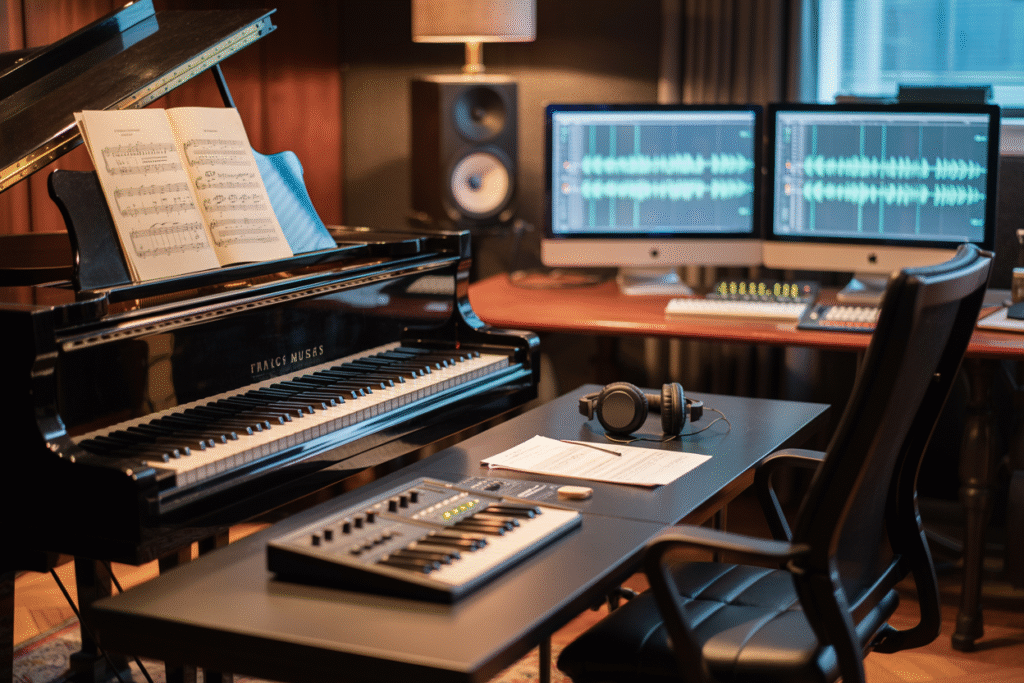You might not know their faces, but you’ve definitely heard their work. Film and TV composers are the hidden architects of emotion, turning scenes into something unforgettable. They don’t appear in the frame, but their music becomes just as iconic as any performance. Let’s meet the creative minds who shaped the way we experience stories without ever stepping into the spotlight.
John Williams Made Magic Sound Real
From Star Wars to Harry Potter, John Williams built entire worlds with his scores. His music is instantly recognizable, and for many fans, it’s the first thing they think of when recalling a scene. He has a gift for turning melodies into emotional anchors. Without him, the opening crawl of Star Wars would feel a lot emptier. He proved that music could be just as legendary as the characters themselves.
Hans Zimmer Turned Bass Into Bravery
Hans Zimmer’s sound is bold, cinematic, and impossible to ignore. From Inception’s mind-bending tones to The Dark Knight’s relentless tension, he pushes the boundaries of film scoring. His use of deep, resonating bass lines makes action feel more intense. Zimmer’s style has inspired countless other composers and shaped how modern blockbusters sound. He made “braaam” a global phenomenon.
Alan Silvestri Made Time Travel Sing
Alan Silvestri gave us the energetic Back to the Future theme, the triumphant notes of The Avengers, and the heartfelt score of Forrest Gump. His music balances fun, emotion, and adventure like few others can. Silvestri has a way of making moments feel timeless—literally, in the case of Marty McFly’s DeLorean. He’s proof that the right score can make any journey unforgettable.
Lorne Balfe Made Espionage Epic
Lorne Balfe has quietly built a reputation for making spy thrillers and action dramas feel larger than life. From Mission: Impossible – Fallout to His Dark Materials, his music builds tension without overpowering the story. He blends orchestral and electronic sounds to create something fresh and modern. Balfe’s scores make you feel like you could dodge lasers and save the day—even if you’re just on the couch.
Ramin Djawadi Brought Fantasy to Life
Ramin Djawadi’s Game of Thrones theme became a cultural event all on its own. He’s a master at weaving together tension and beauty, making his scores both thrilling and emotional. Djawadi has also worked on Westworld and Pacific Rim, showing his range across genres. His music can make a battle feel intimate and a quiet scene feel epic. It’s the sound of worlds being built note by note.
Danny Elfman Made Quirky Cool
Danny Elfman’s music is instantly recognizable for its playful, gothic charm. From The Simpsons theme to Tim Burton’s Batman, he creates soundscapes that feel like characters themselves. His work blends whimsy with a touch of darkness, making him a perfect match for offbeat stories. Elfman’s scores don’t just set the mood—they make it impossible to imagine the story without them.
Ennio Morricone Made Silence Sing
Ennio Morricone transformed the Western with his haunting, inventive scores. From The Good, the Bad and the Ugly to Cinema Paradiso, his music told stories without a single word. He used unconventional sounds—whistles, gunshots, even cracking whips—to bring scenes to life. Morricone proved that music could be both experimental and deeply moving. His influence stretches far beyond the films he scored.
Bear McCreary Made TV Sound Like Cinema
Bear McCreary blurred the line between TV and film music with his work on Battlestar Galactica, The Walking Dead, and Outlander. He mixes traditional instruments with unexpected elements, creating scores that feel fresh yet familiar. His music adds weight and depth to shows, making them feel bigger than the small screen. McCreary shows that TV scores can be just as epic as blockbuster films.
Alexandre Desplat Made Subtlety Shine
Alexandre Desplat’s music is elegant, layered, and often quietly powerful. From The Grand Budapest Hotel to The Shape of Water, he brings a refined touch to every project. His scores often feel like they’re dancing alongside the story rather than dominating it. Desplat’s ability to create emotion through restraint sets him apart. He makes subtlety unforgettable.
Michael Giacchino Made Nostalgia New Again
Michael Giacchino is the king of heartfelt adventure. From Up’s tear-inducing opening sequence to the soaring themes of Star Trek and The Incredibles, he knows how to tug at heartstrings. His music often feels like a love letter to classic film scores while staying fresh for modern audiences. Giacchino proves that you can blend old-school charm with new-school energy and make magic happen.


